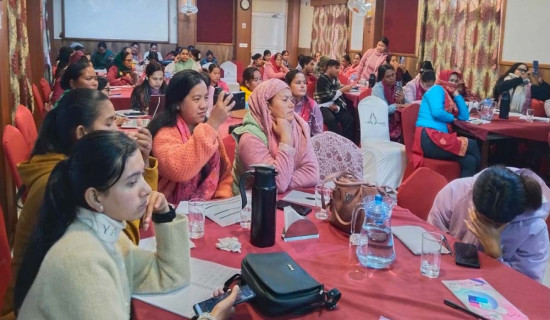- Thursday, 25 December 2025
Behind The Filter
Krishtina Khanal
We all sometimes share a common moment - when standing before the mirror, our minds are filled with thoughts that others are smarter, better-looking, or more successful than us. These fleeting thoughts visit everyone. But for some, these thoughts aren't visitors - they become permanent residents in their minds. This persistent feeling has a name: inferiority complex —termed by psychologist Alfred Adler.
It can be seen across time that feelings of inadequacy are common human experiences, however an inferiority complex represents a deeper psychological pattern that can significantly impact one's life well-being. It is like wearing dark glasses. When you wear them, everything looks darker than it really is. An inferiority complex works the same way. It makes you see yourself as smaller, less skilled, and less worthy than you truly are. This distorted reflection shapes not just how we see ourselves, but how we perceive the world.
The roots of an inferiority complex often trace back to multiple sources. Childhood experiences, particularly those involving excessive criticism or constant comparison can lay the foundation to this phenomenon. Some children learn to measure their worth in older siblings' footsteps. Others find their reflection in the mirrors of parental criticism. Maybe other kids made fun of you. Maybe teachers told you that you weren't smart enough. These small hurts can grow into big wounds over time, and what begins as external judgment eventually turns and becomes a strong internal conviction.
Social media and modern cultural pressures have added new dimensions to this challenge. These platforms are partly responsible for creating unprecedented opportunities for comparison and self-judgment. Through screens that mostly never sleep, we compare our behind-the-scenes footage to everyone else's highpoint reel. Where once we measured ourselves against our neighbours, now we compete with carefully curated global ideals. The result is a generation that feels simultaneously more connected and more inadequate than ever before.
While everyone occasionally feels inadequate, an inferiority complex pervades multiple aspects of life. Professionally, individuals might avoid career advancement opportunities, believing themselves unworthy of success. In relationships, they may struggle with intimacy, fearing rejection or judgement. This emotional toll often includes anxiety, depression, and a persistent sense of being "less than" others. Modern research has also identified several key manifestations of inferiority complex: persistent self-criticism and negative self-talk, hypersensitivity to criticism from others, tendency to withdraw from social situations, difficulty in accepting compliments or recognition, and compensatory behaviours ranging from perfectionism to aggression.
But, not all who struggle are lost because where there are roots of inadequacy, seeds of transformation can also grow. Cognitive Behavioural Therapy (CBT) has proven particularly effective in addressing the negative thought patterns at its core. Through CBT, individuals learn to identify and challenge self-defeating beliefs, and gradually replace them with more realistic and compassionate self-assessments. Self-awareness also plays a crucial role in recovery. Recognition of one's inferiority complex is often the first step towards change.
Educational institutions and workplaces can help by fostering environments that value diverse forms of achievements and promote collaboration over constant competition. Also, media literacy can help individuals critically evaluate the unrealistic standards often presented in social media and advertising. The journey from inferiority complex to healthy self-image requires patience and often professional guidance. As Adler emphasises, the goal isn't to eliminate all feelings of inferiority – these can sometimes motivate growth—but to develop a balanced self-perception that acknowledges both one’s strengths and limitations. The next time you feel small, remember this: everyone has worth. Everyone has something to give. Including you. Your doubts may feel big, but your power to overcome them is even bigger.















-original-thumb.jpg)
-original-thumb.jpg)